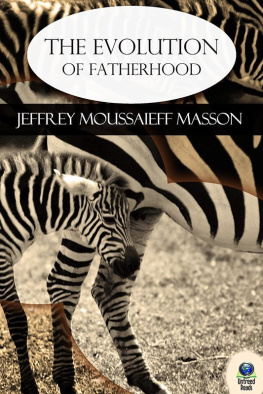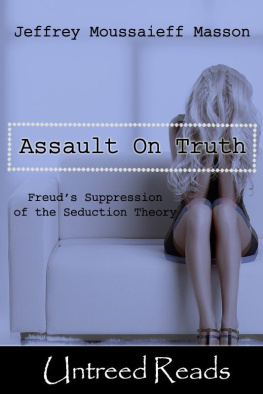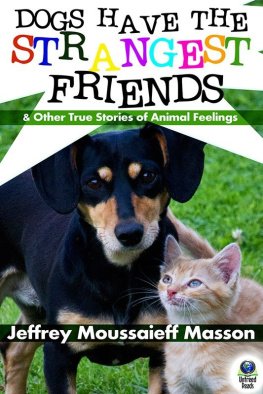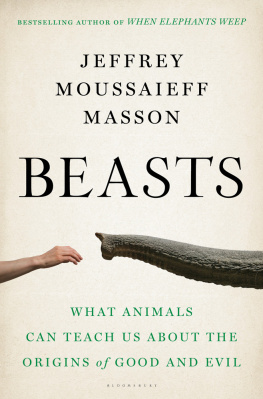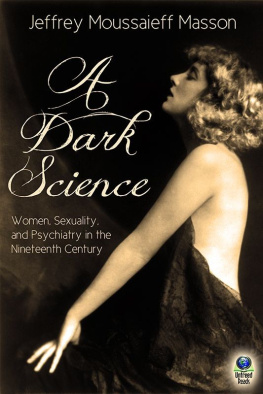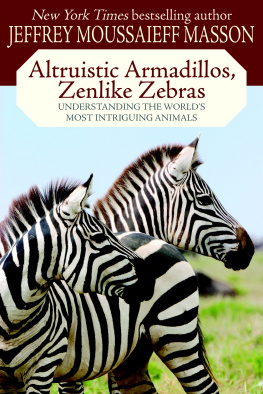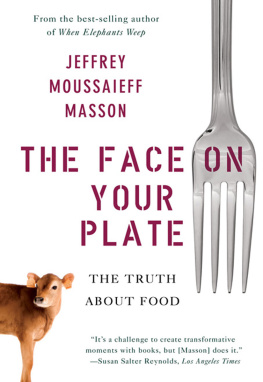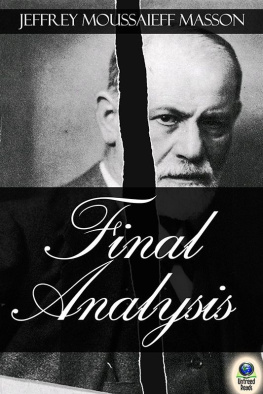
Table of Contents
The Evolution of Fatherhood:
A Celebration of Animal and Human Families
By Jeffrey Moussaieff Masson
Copyright 2012 by Jeffrey Moussaieff Masson
Cover Copyright 2012 by Ginny Glass and Untreed Reads Publishing
The author is hereby established as the sole holder of the copyright. Either the publisher (Untreed Reads) or author may enforce copyrights to the fullest extent.
Previously published in print, 1999.
Formerly titled The Emperor's Embrace.
This ebook is licensed for your personal enjoyment only. This ebook may not be resold, reproduced or transmitted by any means in any form or given away to other people without specific permission from the author and/or publisher. If you would like to share this book with another person, please purchase an additional copy for each person you share it with. If youre reading this book and did not purchase it, or it was not purchased for your use only, then please return to your ebook retailer and purchase your own copy. Thank you for respecting the hard work of this author.
Also by Jeffrey Moussaieff Masson and Untreed Reads Publishing
Final Analysis
Against Therapy
Raising the Peaceable Kingdom
The Assault on Truth
The Cat Who Came in From the Cold
http://www.untreedreads.com
More praise for Jeffrey Moussaieff Masson and The Evolution of Fatherhood
An ode to fatherhood. Massons celebration of exotic parenting stylesbecome a vibrant plea for the care we should all take care of our children, of each other, and of other species.
Richard Wrangham
Chair, Biological Anthropology
Department of Anthropology
Harvard University
A valuable and fascinating contribution to the debate on mans relation to nature. Even for those who disagree, the wit of Jeffrey Massons argument and the thousand little facts and anecdotes he serves with it make this book a pleasure.
Mark Kurlansky Author of 1968 and Cod
Must reading as we enter the twenty-first century I recommend this book to all people who want to make a better world for future generations.
Marc Bekoff
Professor of Biology,
University of Colorado at Boulder
Coauthor of Natures Life Lessons
Jeffrey Moussaieff Masson is our boldest speculator.
Los Angeles Times
For Leila and our sons Ilan and Manu, and for Terri and our daughter, Simone
ACKNOWLEDGMENTS
I could not have written this book without my children, Simone, Ilan, and Manu, or without their mothers, Terri and Leila. Terri is still, thirty years later, a wonderful mother to Simone, and Simone and her friend Stephanie are among the sharpest critical thinkers I know. It has been wonderful to spend a year in Boston near them. I never thought I could experience twice the joy that a small being can bring to your life. But as a third-time dad, I know it is possible. Thank you, Simone, Ilan, and Manu, for being the joy of my life, and thank you, Terri and Leila, for making it possible. I cannot forget my own mother and father. My mother, Diana, is now eighty-five and still charming and full of the zest for life that she always had. My father, Jacques, died seven years ago at eighty-five, and I still dream about him on a regular basis. I miss him terribly. I only wish that I knew then what I know now and could have enjoyed my childhood years with him more fully. Leila, my dearest companion, has read every word of this book in manuscript. Her medical and pediatric knowledge has been an enormous help, her intuition has been invaluable, and her example as an all-loving mother has been essential. My friend Daniel Ellsberg, when he met Leila for the first time, took me aside and said he thought she might come from a different planet, so pure did she appear. I have been with her now for almost ten years, and I am inclined to agree. I am the luckiest man alive to be sharing children, home, and love with her.
The idea for the book came from Sally Wofford-Girand, who has many brilliant ideas, and my Italian agent, Vicki Satlow. They had faith in me when I did not. Elaine Markson, my agent in New York, has held my hand for most of my writing career. I only wish I could have benefitted from her wisdom and levelheadedness in my psychoanalytic days. My editor, Nancy Miller, had already edited four of my books, and I knew her skills, but it was still nothing short of miraculous to watch her help me turn this budding idea into a book. Thank you, Nancy, from the bottom of my heart for your faith in me and your friendship over more than twenty years. I also want to thank the whole team at The Random House Publishing Group: Deirdre Lanning, Patricia Nicolescu, Mark Maguire, Gilly Hailparn, and Gina Centrello.
I began writing The Evolution of Fatherhood in the Wagnerian town of Bayreuth, in Germany. We were staying with the Zeidler family, and nothing could have provided a better antidote to the grandiosity of that town. The warmth of their family was so palpable, their love for one another so catching, that I could not wait to sit down and think about family and fatherhood. In Berlin, Professor Dietmar Todt from the department of behavioral biology at the Freie Universitt was welcoming and cordial. Dr. Halger Kulmeyer, the librarian at the school of veterinary medicine at the university, was astonishing in his ability to find anything on the Net and get it into my hands five minutes later. This is the second book he has helped me with, and I am most appreciative.
At the inception of this book, I was encouraged by Michael Lamb, who has written so much about human fathers in a broad perspective; by Susan Airport, who has written a wonderful book of her own, Natural Parenting ; and by Melvin Konner, whose many books and articles taught me about what humans did when they were not overconstrained by culture. Donna Haraway took me for a wonderful walk in the woods of Northern California and imparted wisdom that was just beyond my grasp. My friend Neil Malamuth talked to me about evolutionary psychology, and although he did not convince me, it was a valuable introduction. My friend Dick Trexler tried to talk to me about infanticide in humans, but I am tone-deaf. My friend Nancy Schepper-Hughes gave me her marvelous book about Brazilian mothers that held my interest for days. Rafael Marquez sent me many articles about fascinating frog fathers.
I want to thank my hero in the world of animal behavior, Donald Griffin, who died at eighty-eight, but until the end was still inventing new ways to examine the minds of animals, and whose absolute scientific integrity has been a beacon of light to many younger colleagues. It was his three books about animal consciousness that introduced me to a new field, cognitive ethology, which he invented. I feel deeply honored that we were able to spend some time together while I lived in Boston for one year. I took advantage of the proximity of Harvard to have two memorable lunches with another of my heroes, the late Stephen J. Gould. I was lucky also to be able to discuss ideas with Richard Wrangham, chairman of biological anthropology at Harvard, who is a charming skeptic and a brilliant researcher. He was kind enough to read the entire manuscript and save me from embarrassing blunders. Irven DeVore, the former chairman of the department of anthropology at Harvard, received me with great courtesy.
When it comes to inspiration, nobody can replace Elizabeth Marshall Thomas. I only wish I had her gifts, both of observation and of writing. Failing that, I can at least acknowledge how her best-selling books have opened new possibilities in publishing about the inner life of animals.
In a similar category is the lesser known but no less talented Hope Ryden, whose beautiful book about beavers deserves more recognition as one of the great classics of animal writing.
Next page
